It’s difficult to predict what questions will come up for the Shakespearean play. A couple of years ago a lot of multinational companies in Ireland complained that graduates were increasingly finding it difficult to critically analyse data – in other words, to think about large amounts of information and pick out what mattered. Simultaneously, concerns were raised about grade inflation – the number of people achieving high grades in school and college exams kept increasing. The population weren’t getting any cleverer, so the exams must be getting easier.
The examinations commission responded and as a result the more predictable (‘there’s always a character Q’ or ‘personal response’ in poetry) questions are disappearing. There is no need to despair however. You know plenty – you just need a strategy to pick out what matters on the day.
If you figure out how to do this then you’ll also have developed a skill that will last you a lifetime, and one which multinational corporations will be looking for when you graduate college and are looking for a job. So it’s not all a big waste of time even if it feels like that now!
First of all let’s look at the broad categories questions usually fall into.
- CHARACTER
- THEME
- OPEN
- STYLE
You must be able to discuss the following when it comes to characters:
HAMLET
- his state of mind (mostly revealed in soliloquies)
- his ‘madness’
- his delay (procrastination)
- his nobility (is he a good man?) / strengths & weaknesses
- a tragic hero or an anti-hero?
- his relationship with Claudius (the struggle between them)
- his relationship with women (Gertrude & Ophelia) & treatment of them
CLAUDIUS (a good king? a villain? or an admirable villain?)
GERTRUDE (a good mother despite her flaws? a negative portrayal of women?)
OPHELIA (an innocent victim or a weak and foolish girl? a negative portrayal of women?)
I seriously doubt (please don’t let this come back to haunt me) they’ll ask you to discuss one of the minor characters like Polonius or Horatio, but be able to write one paragraph on each as they would be relevant in discussing good versus evil or loyalty and betrayal. You also need to be able to write one paragraph on Fortinbras and one on Laertes for the theme of revenge.
The major themes in the play are:
- Revenge (and justice)
- Good versus Evil
- Loyalty & Betrayal
- Appearance versus Reality (Deception)
- Power & Corruption
- Death
- Love
For each theme – no matter what the wording – ask yourself
- WHO does this theme apply to?
- HOW / WHY does this character have to deal with this issue?
- Do they CHANGE over the course of the play?
- Are there any SCENES which highlight this theme specifically?
- What are our FINAL IMPRESSIONS of this issue?
Asking these questions – and being able to come up with answers yourself – is what critical analysis is all about. Also, anything you take the time to figure out for yourself sticks in your brain. Reading someone else’s ideas just isn’t quite the same!
Open questions ask you to discuss the entire play – not the plot, but your experience of watching/studying the play.
- Favourite / most dramatic scene.
- Relevance to a modern audience.
- Although Hamlet is a tragedy, it is a play with many memorable comic moments – discuss.
- Hamlet is a dark, depressing and pessimistic play – discuss.
Style questions are quite difficult and pretty rare in the new course (so far) – they ask you to look at how the play is written.
- Language & imagery.
- Dramatic function of various characters (how they make the plot more compelling).
No matter how the question is phrased on the day, you must stay calm. Keep using the words from the question and synonyms.
Write down the 5 key Q’s – 1. WHO? 2. HOW/WHY? 3. CHANGE? 4. SCENES? 5. FINAL IMPRESSIONS?
You must quickly plan your 6 paragraphs.
As you are writing, if one paragraph gets too long, turn it into two, no big deal.
Beware of just starting to write and writing until the hour is up (writing whatever comes into your head without doing any planning). This stream of consciousness approach tends to lead to waffle, plot summary and lots of irrelevant information which has nothing to do with the question.
Keep the question in your mind at all times as you write. Remember you must demonstrate that the information you are including is relevant to the question being asked.
If any of the questions above freak you out why not try to figure out what you might discuss now, rather than on the day? You don’t have to write the full essay, you could just plan your 6 paragraphs and think about what quotes you might include.
Good luck!
 Sometimes you are asked to comment on the appropriateness of the title of a poem, novel, play etc…
Sometimes you are asked to comment on the appropriateness of the title of a poem, novel, play etc…




